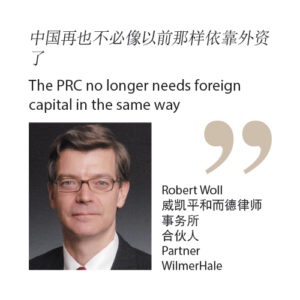An internal memo from the China Securities Regulatory Commission has thrown the future of the variable interest entity into doubt. With this, and new requirements for a national security review and anti-monopoly review, China is erecting new barriers to inbound mergers and acquisitions. By Alice Gartland
The inbound M&A landscape has changed. It’s a “more difficult environment for foreign investors,” says Robert Woll, a partner at WilmerHale in Beijing. And it’s characterized by a more conservative approach.
Global economic and political troubles continue to strengthen the PRC’s position vis-à-vis the rest of the world and “the PRC no longer needs foreign capital in the same way,” says Woll.
China is focused on becoming “a global leader in high technology and innovation,” says Sven-Michael Werner, a partner at Taylor Wessing in Shanghai, and this is shaping foreign investment law and policy in a way that can seem like bad news for foreign investment.
The end of the VIE?
In August, someone in the research department of the China Securities Regulatory Commission (CSRC) prepared a memo on the future of the variable interest entity (VIE). VIE is an investment structure that has been used by foreign parties to invest in industries in China in which foreign investment is restricted or prohibited.
You must be a
subscribersubscribersubscribersubscriber
to read this content, please
subscribesubscribesubscribesubscribe
today.
For group subscribers, please click here to access.
Interested in group subscription? Please contact us.






















